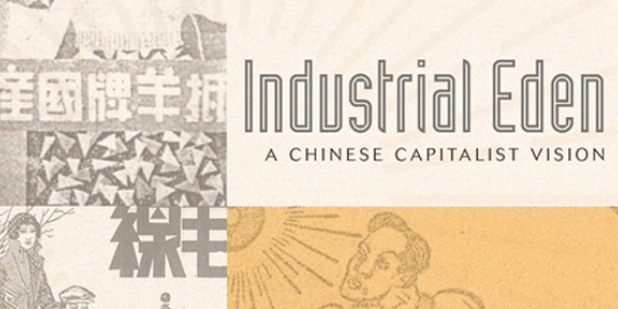Join us for a free one-day workshop for educators at the Japanese American National Museum, hosted by the USC U.S.-China Institute and the National Consortium for Teaching about Asia. This workshop will include a guided tour of the beloved exhibition Common Ground: The Heart of Community, slated to close permanently in January 2025. Following the tour, learn strategies for engaging students in the primary source artifacts, images, and documents found in JANM’s vast collection and discover classroom-ready resources to support teaching and learning about the Japanese American experience.
Industrial Eden: A Chinese Capitalist Vision
The East Asian Studies Center at the University of Southern California presents a faculty book launch for Brett Sheehan's "Industrial Eden: A Chinese Capitalist Vision."
Where

EASC would like to celebrate the book launch of Professor Brett Sheehan's newest publication entitled Industrial Eden: A Capitalist Vision (Harvard University Press, 2015). Georgia Mickey, Associate Professor of History at Cal Poly Pomona, will discuss the book and a light reception will follow.
Brett Sheehan is a Professor of Chinese History at the University of Southern California. He is also the author of Trust in Troubled Times: Money, Banking, and State-Society relations in Republican Tianjin, 1916-1937 (Harvard University Press, 2003), and numerous articles and book chapters. His latest publication is an illuminating study of the evolution of Chinese capitalism, chronicling the fortunes of the Song family of North China under five successive authoritarian governments. Headed initially by Song Chuandian, who became rich by exporting hairnets to Europe and America in the early twentieth century, the family built a thriving business against long odds of rural poverty and political chaos. Professor Sheehan shows how the Song family engaged in eclectic business practices that bore the imprint of both foreign and traditional Chinese influences. Businesspeople came to expect much from increasingly intrusive states, but the position of private capitalists remained tenuous no matter which government was in control. Although private business in China was closely linked to the state, it was neither a handmaiden to authoritarianism nor a natural ally of democracy.
Click here for ordering information and synopsis from Harvard University Press
RSVP here to attend.
Featured Articles
Please join us for the Grad Mixer! Hosted by USC Annenberg Office of International Affairs, Enjoy food, drink and conversation with fellow students across USC Annenberg. Graduate students from any field are welcome to join, so it is a great opportunity to meet fellow students with IR/foreign policy-related research topics and interests.
RSVP link: https://forms.gle/1zer188RE9dCS6Ho6
Events
Hosted by USC Annenberg Office of International Affairs, enjoy food, drink and conversation with fellow international students.
Join us for an in-person conversation on Thursday, November 7th at 4pm with author David M. Lampton as he discusses his new book, Living U.S.-China Relations: From Cold War to Cold War. The book examines the history of U.S.-China relations across eight U.S. presidential administrations.




